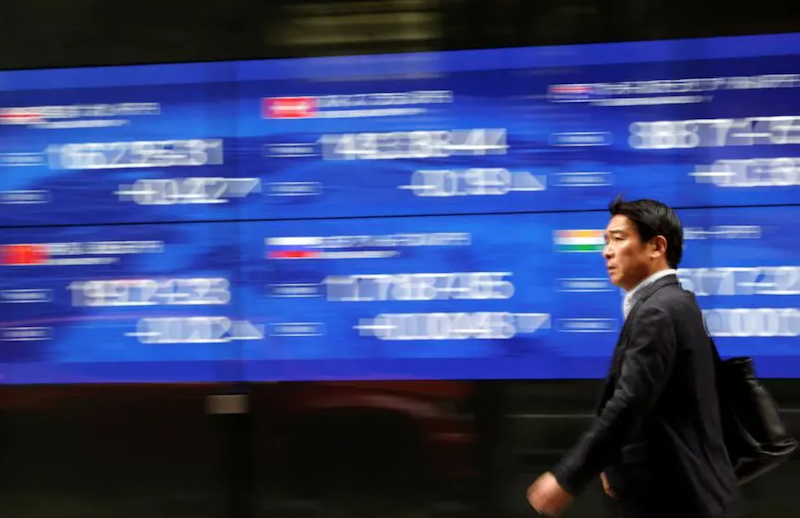Asian stocks were in retreat on Thursday with investors rattled amid ever-escalating China-US tensions and after it emerged the US Fed is set to continue with its aggressive rate hikes campaign.
That saw a 3% slump in tech-sensitive Hong Kong while mainland China shares also slipped with Beijing and Washington at loggerheads over new chip metal restrictions.
Meanwhile, stocks in Japan continued to slide after a months-long charge that has seen the index hit 33-year highs.
Tokyo’s Nikkei share average closed at a more than one-week low, dragged down by chip-related firms as Socionext fell to its daily lower limit, after its biggest shareholders sold their entire stake in the fast-growing chip-design company.
Also on AF: Security Concerns Seen Undermining Yellen’s China Visit
The Nikkei dropped 1.70% to close at 32,773.02, its lowest close since June 27, after posting its sharpest daily drop since June 7. The broader Topix lost 1.26% to 2,277.08.
Socionext’s shares tanked 22.78% after shares were untraded most of the session, following the announcement that its top shareholders, including Panasonic Holdings and Development Bank of Japan, would sell their entire stake worth 280 billion yen ($1.94 billion).
Socionext, which went public in October, surged nearly 200% this year, becoming one of the icons for chip-related shares that helped the Nikkei to reach a 33-year high.
Hong Kong stocks plunged, tracking weakness in regional markets after confirmation of a hawkish stance from the US Federal Reserve and a ratcheting up of Sino-US frictions. China shares also fell.
While almost all Fed officials agreed to hold interest rates steady last month, minutes of the meeting released on Wednesday showed the vast majority expected policy would eventually need to tighten further.
Also dampening risk appetite was an influential Chinese trade policy advisor’s statement that China’s export controls on metals used in semiconductors are “just a start”, as Beijing ramps up a tech fight with Washington.
The market is already suffering from signs of China’s flagging post-Covid recovery.
Yen Strengthens Against Dollar
The Shanghai Composite Index slipped 0.54%, or 17.37 points, to 3,205.57, while the Shenzhen Composite Index on China’s second exchange retreated 0.37%, or 7.49 points, to 2,044.03.
The Hang Seng Index fell 3.02%, or 577.33 points, to 18,533.05, and was on track for its worst day in six months. Financial shares led the decline, after Goldman Sachs on Wednesday downgraded some major Chinese banks.
An index tracking Hong Kong-listed Chinese banks tumbled nearly 6% to seven-month lows.
Elsewhere across the region, in earlier trade, Sydney, Singapore, Seoul, Taipei and Manila were also down. However, Mumbai, Wellington and Jakarta eked out gains.
MSCI’s broadest index of Asia-Pacific shares dropped 1.3%, following a 0.4% decline for the world index on Wednesday.
US 10-year Treasury yields climbed to a fresh four-month high in Tokyo trading and the dollar extended its rise against major peers.
An exception was the yen, which strengthened against its US rival as traders fretted about the potential for currency intervention.
US E-mini stock futures pointed to a 0.4% lower restart for the S&P 500, following its overnight 0.2% drop. UK FTSE and German DAX futures each fell about 0.4%.
Oil Prices Slip
The US dollar index, which measures the currency against six peers, including the euro and yen, extended Wednesday’s 0.23% gain to be up as much as 0.13% to 103.46 in Asian trading.
Against the yen, though, the dollar dropped, despite the currency pair’s traditional close relationship with long-term US yields.
The dollar declined 0.54% to 143.875 yen on Thursday, undoing all of the previous day’s 0.13% advance.
Japanese officials have sounded almost daily warnings over yen weakness as it approached the 145 level that triggered intervention last autumn. The dollar briefly touched 145.07 yen on Friday.
Meanwhile, oil prices slipped in Asian trade on Thursday as fears of a sluggish demand recovery in the world’s top crude importer, China, offset the prospect of tighter supply, with leading exporters Saudi Arabia and Russia cutting output.
Brent crude futures dipped 25 cents, or 0.3%, to $76.40 a barrel, after settling higher 0.5% the previous day.
US West Texas Intermediate crude fell 7 cents, or 0.1%, to $71.72 a barrel, after closing 2.9% higher in post-holiday trade on Wednesday to catch up with Brent’s gains earlier in the week.
Key figures
Tokyo – Nikkei 225 < DOWN 1.70% at 32,773.02 (close)
Hong Kong – Hang Seng Index < DOWN 3.02% at 18,533.05 (close)
Shanghai – Composite < DOWN 0.54% at 3,205.57 (close)
London – FTSE 100 < DOWN 1.18% at 7,354.49 (0935 GMT)
New York – Dow < DOWN 0.38% at 34,288.64 (Wednesday close)
- Reuters with additional editing by Sean O’Meara
Read more:
Curbs on Chipmaking Metals ‘Just The Beginning’, China Warns
Big Funds Eye Tokyo Amid Negative Sentiment on China Stocks
China’s Services Sector Slowing, Caixin June Survey Shows
























